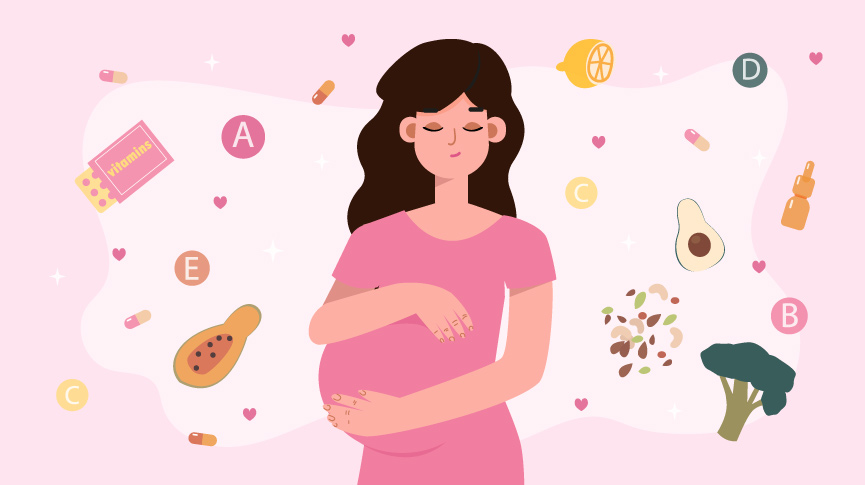Do I Need Prenatal Vitamins?

Pregnancy can be such a special time and is most likely full of questions about your changing body, and how to best support it.
While many of our nutrients come from food, sometimes we need a little extra boost – especially when pregnant.
That’s where prenatal vitamins come in. Supplements that are specifically designed for people who are expecting. But what exactly does that mean? What makes prenatal vitamins special? And why should people take them – or not take them?
Let’s find out!
Benefits of prenatal vitamins?
Prenatal vitamins are easy to ingest supplements used to add extra nutrition and the necessary building blocks for a pregnant person and their growing fetus.
They can be especially helpful in the first trimester when people are more prone to nausea and may have a limited appetite.
What are some other ways prenatal vitamins support a healthy pregnancy? When to start taking prenatal vitamins?
They Support Your Baby’s Development
Growing a human takes a lot of work! What you put into your body helps your baby grow and develop.
You may be wondering what nutrients do what.
Much like with people who are already born, calcium and vitamin D helps with the development of your baby’s teeth and bones.
Omega 3 fatty acids, which can be found in different varieties of fish as well as plant sources like hemp and chia seeds, are helpful for a baby’s brain development, along with Choline.
Help Prevent Preterm Labor
The vital mineral magnesium may reduce the risk of pre-eclampsia, or high blood pressure during pregnancy, as well as fetal growth restriction, and preterm birth.
Preventing Neural Tube Defects
Neural tube defects are a form of birth defects that affect the baby’s brain. The most common being spina bifida and anencephaly.
When it comes to preventing neural tube defects, experts suggest the use of folic acid supplements. The U.S. CDC (Center for Disease Control and Prevention) advises people who are already or may become pregnant to take 400 mcg of folic acid daily.
These defects typically occur in the first few weeks of pregnancy, oftentimes before someone even realizes that they’re pregnant. This is why they suggest anyone who may become pregnant incorporate folic acid into their wellness routine.
They Support The Placenta and Fetus
Blood volume during pregnancy can increase anywhere from twenty to one hundred percent above non-pregnancy levels, with the average being forty-five percent.
With all that extra blood, your body will need more iron than it typically gets. Iron supplements during pregnancy are essential for supporting your increased blood volume, as well as the placenta, and your growing baby.
Blood loss is normal during birth. Taking iron during pregnancy helps protect you during birth and prevent complications by adding more blood into your circulation in the first place, and preventing excessive blood loss.
Experts suggest taking 30 mg of iron a day, which can often be found in a prenatal multivitamin.
Some people may need even more iron if they are anemic or prone to anemia, they are pregnant with multiples, or they didn’t take iron regularly until later on in their pregnancy.
You can also help support your iron levels by eating foods that are rich in it like legumes, red meat, and dark leafy greens.
If your iron supplements increase your morning sickness or cause constipation, try taking a different one, asking your doctor for a recommendation, or taking a gentle pregnancy-approved stool softener.
It May Reduce the Risk of Autism
Researchers found that people who took folic acid or a multivitamin during pregnancy were seventy-three percent less likely to have a child with an autism spectrum disorder.
While these results don’t necessarily mean a simple cause and effect, it is something to keep in mind when deciding whether or not to take prenatal vitamins.
Things to Be Cautious Of
Unless otherwise advised by your healthcare provider, only take the recommended dose of prenatal vitamins.
Besides constipation, most of these nutrients are harmless if you take more than the normal dose. Excess vitamin A however can potentially cause liver damage, and possibly lead to birth defects.
Extra Vitamin E should also be avoided during pregnancy, as it may increase the risk of premature breaking of the amniotic sack, and abdominal pain in the pregnant person.
Can You Take Prenatal Vitamins Without Being Pregnant?
Prenatals aren’t just for people who are already pregnant, they can also be helpful for those who are trying to conceive.
Pregnancy can come unexpectedly, but if there’s a chance you become pregnant, you can help support your body and a potential fetus by taking prenatal vitamins and supplements before conceiving.
We understand that this is a lot of information to navigate, and extra things to add to your life. When picking a prenatal vitamin, consult your doctor, it can be helpful to have your nutrient levels tested and then go from there.
Picking a multivitamin doesn’t need to be stressful! Try to find a brand that makes it seamless by packing it all in one or two easy-to-take capsules or handy packets that are already dosed out.
You got this!

Natasha (she/her) is a full-spectrum doula and health+wellness copywriter. Her work focuses on deconstructing the shame, stigma, and barriers people carry around birth, sex, health, and beyond, to help people navigate through their lives with more education and empowerment. You can connect with Natasha on IG @natasha.s.weiss.


